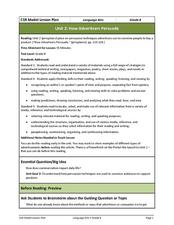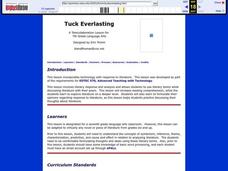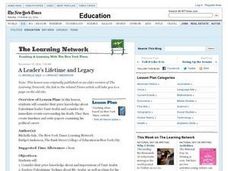Curated OER
How Advertisers Persuade
This plan centers around the article "How Advertisers Persuade," although it is not included in the instructional activity itself. Get your class thinking about advertising, appeals, and techniques that companies use to get their...
Advocates for Human Rights
Nativism and Myths about Immigrants
Where do anti-immigrants myths come from, and how can they be refuted? Learners critically analyze media reports and how to identify reliable sources. After studying a timeline that details the history of US nativism, groups research the...
Curated OER
Sounding Off About Impeachment
Help your middle and high schoolers reflect on the responsibility of newspapers to act as a vehicle for 'everyday citizens' to voice their opinions. Then, using an article about the first day of the Senate impeachment trial of President...
Curated OER
Where Do You Stand?
Scholars assess a government's ability to intervene in personal health decisions. They research basic facts about euthanasia and describe their opinions about new legislation passed in the United States Congress about an individual's...
Curated OER
Tuck Everlasting
Seventh graders use literary terms while discussing literature with their peers. They explore literature on a deeper level. Students formulate their opinions regarding response to literature, as this lesson helps students practice...
Curated OER
Justice Is Blind, Colorblind That Is
It's so interesting to see kids respond to articles about education. To start the day, prompt learners to discuss the words colorblindness and diversity. Then, split your class in two and have one side read an article from 2007 and the...
Curated OER
What Has Brown Done for You?
Learners review the facts of the court case Brown v. Board of Education. Next, they research recent court cases that uphold contrasting views on the landmark decision. They write opinions about these recent court cases from a 1954...
New York State Education Department
TASC Transition Curriculum: Workshop 11
You'll C-E-R a difference in classroom achievement after using a helpful lesson. Designed for economics, civics, government, and US history classes, participants practice using the CER model to craft arguments about primary and secondary...
Curated OER
A Leader's Lifetime and Legacy
In this lesson plan, students consider their prior knowledge about Palestinian leader Yasir Arafat and consider the immediate events surrounding his death. They then create timelines and write papers examining his political career.
Curated OER
Your Right to an Attorney
An outstanding lesson plan on a person's right to have attorney's representation in a court case is here for your young learners of the law. Pupils read a lengthy account that spells out the laws regarding legal representation, then...
Harry S. Truman Library & Museum
Marshall Plan: Convince the American People
This is an excellent resource for US history classes, especially AP history. After learning some background on the Marshall Plan, the class, divided into two groups, researches opposing positions on this aid program. Groups read and...
PBS
Does Art Imitate Life?
Write what you know, sound advice for any writer and something many famous authors are known to have done. Use these materials to explore how Shakespeare's life influenced his plays. This resource is packed with readings, video segments,...
Curated OER
Children's Media and Censorship
High schoolers form opinions about children and television censorship after analyzing literature. They complete a journal writing activity to identify the topic and make a list of inappropriate television shows for children. Next, they...
Curated OER
Strong Convictions
How can the rhetorical structure of an editorial help to develop its argument? Use this New York Times editorial to emphasize the importance of structure in a piece of informational text. Adolescent writers then use the editorial as a...
Curated OER
The Diary of Col. William Fairfax Gray
Fourth graders examine facts and opinions given by William Fairfax Gray in his diary, compare and contrast ideas expressed in his diary, express opinions using correct language arts skills, and calculate answers to given mathematical...
Curated OER
The Vaccination Question
Young scholars share opinions about common vaccines, then consider facts and opinions about the HPV vaccine and hold a fishbowl and discussion. They survey members of the community to determine their perspectives on the issue.
Curated OER
Up, Up, and Away
Middle schoolers research hot-ballooning using Internet resources including an around-the-world balloon flight. They determine fact from opinion, examine point of view, and determine main idea, and details. They write a journal entry...
Curated OER
Speak Out!
Students consider their opinions on various topics and issues related to the terrorist attacks on the United States on September 11, 2001. Then, focusing on one specific topic, each student supports his or her opinions in a...
Curated OER
Like It Or Not?
Write a review of the film adaptation of Holes. After viewing the film, your young reviewers make recommendations about viewing the film. Using details to support their opinions, they highlight the important parts of the movie without...
Curated OER
Osage, Legend, and Arkansas History
Elementary schoolers evaluate the legend of Norristown Mountain by looking at facts about the Osage Indians and the legend itself. They do an exploration of Arkansas' Native American groups which includes a look at their legends,...
Museum of Tolerance
Developing Media Literacy
To protect young people from questionable content, many schools limit access. This resource suggests that because learners can so readily avail themselves to unrestricted Internet access, it is vital for 21st century learners to develop...
Curated OER
Collective Poetry: Teaching Tolerance
Help your class create collective poetry following a simple, engaging model from Teaching Tolerance (tolerance.org). Each young poet writes five things on an index card: sayings from others, favorite sound, favorite place, favorite...
Curated OER
Men of Steel
Students explore early 20th century steel making. In this U.S. history steel making activity, students view and describe a postcard and a picture depicting exaggerated aspects of the steel industry. Students listen to a poem about Joe...
State Bar of Texas
Sweatt v. Painter
Is separate but equal actually equal? The 1950 Supreme Court case Sweatt v. Painter discusses the law of segregation and inequality. Scholars investigate the impact of the case on the desegregation of public schools across the nation...

























